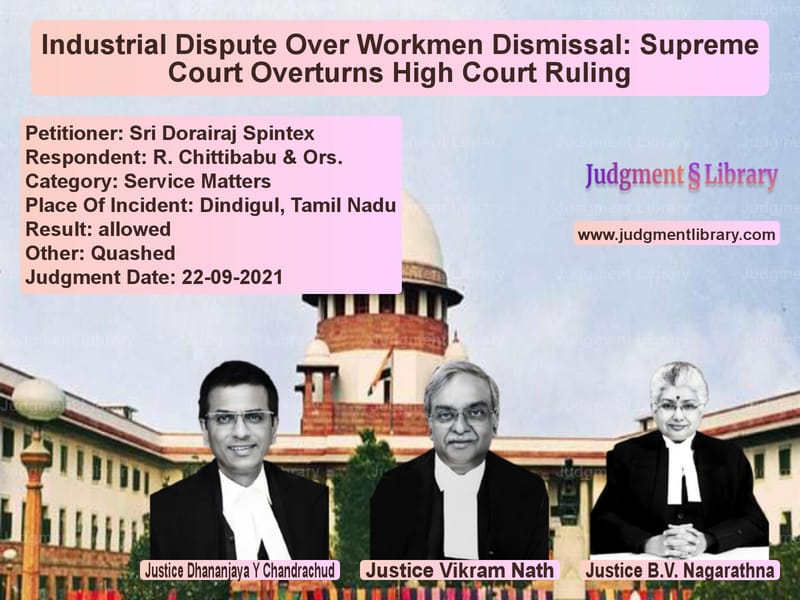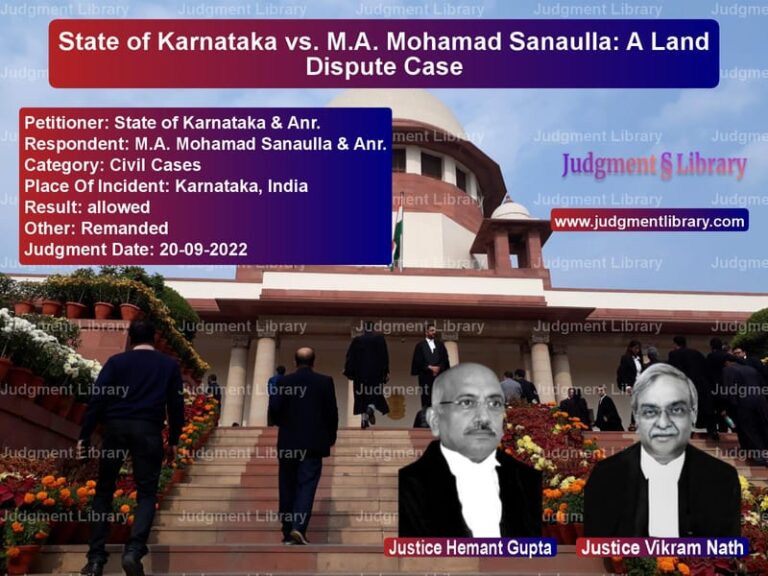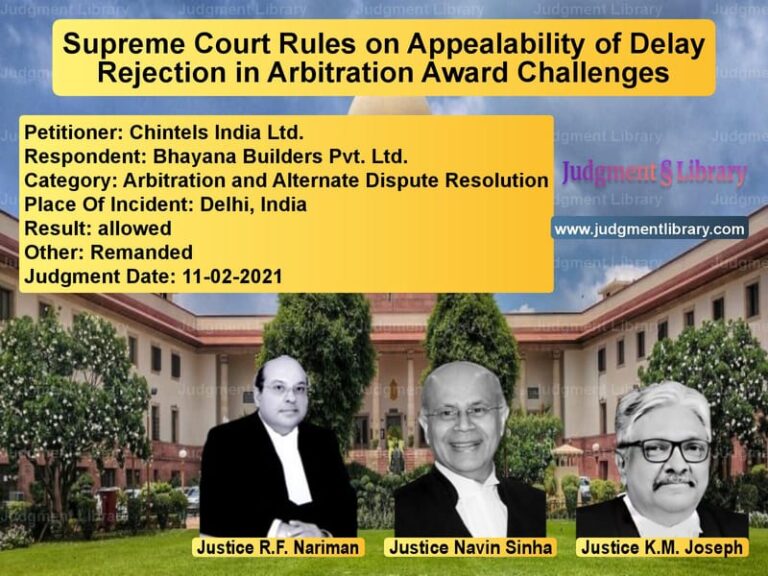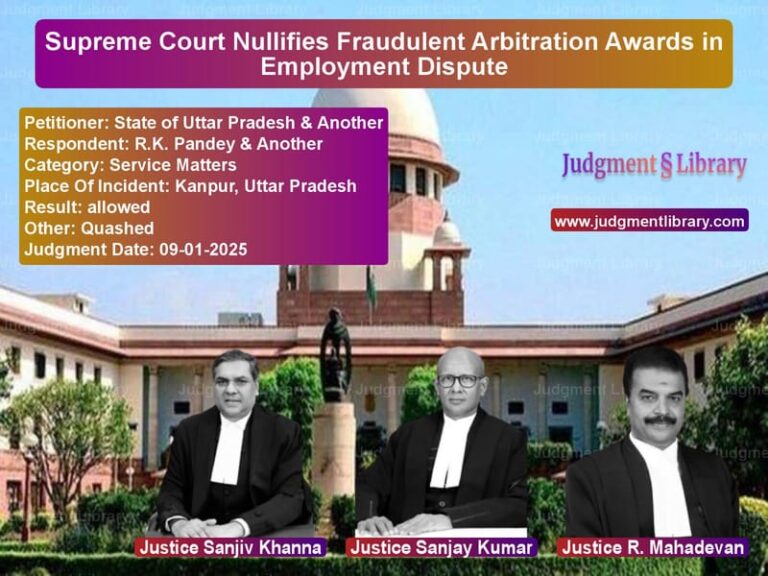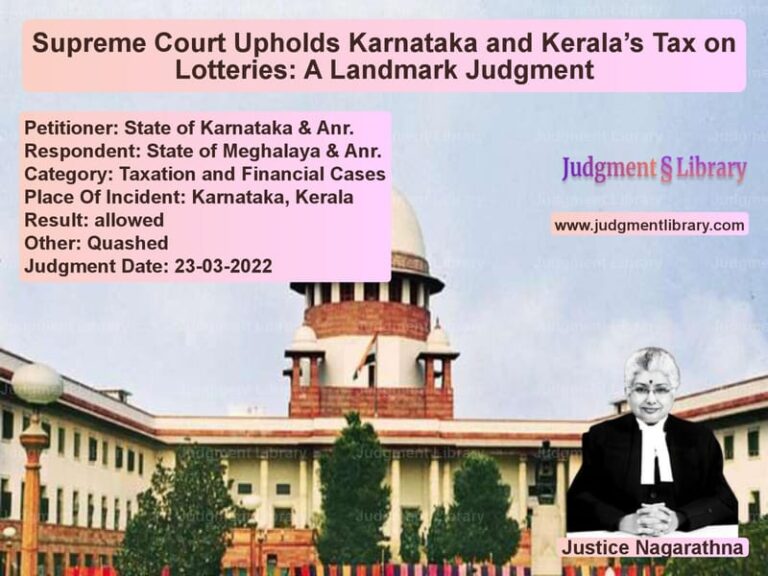Industrial Dispute Over Workmen Dismissal: Supreme Court Overturns High Court Ruling
The Supreme Court of India recently ruled on a crucial case involving labor rights and employer obligations in Sri Dorairaj Spintex vs. R. Chittibabu & Ors.. The case revolved around the termination of thirty-one workmen and the interpretation of Sections 33(1)(b) and 33(2)(b) of the Industrial Disputes Act, 1947. The Supreme Court overturned the Madras High Court’s decision, holding that the employer had lawfully dismissed the employees under Section 33(2)(b) and that prior approval under Section 33(1)(b) was not required.
Background of the Case
The case arose when the management of Sri Dorairaj Spintex, located in Dindigul District, Tamil Nadu, sought approval from the Assistant Commissioner of Labour to dismiss thirty-one workmen. The key events leading to the dispute were:
- On July 4, 2002, the workmen raised an industrial dispute under Section 2(k) of the Industrial Disputes Act, which was taken into conciliation.
- While conciliation was ongoing, the workers initiated a stay-in strike on July 31, 2002.
- On August 1, 2002, another industrial dispute was raised and taken into conciliation.
- The management initially suspended forty-seven workmen and issued charge memos on August 20, 2002.
- Disciplinary proceedings were conducted, and dismissal orders were issued on November 16, 2002.
- The management then filed an application for approval under Section 33(2)(b) with the Assistant Commissioner of Labour.
Decision of the Assistant Commissioner of Labour
The Assistant Commissioner of Labour rejected the employer’s application, holding that:
- The industrial dispute raised on July 4 and August 1, 2002, was still under conciliation.
- Since conciliation was ongoing, prior approval under Section 33(1)(b) was necessary before terminating the workmen.
- As the employer failed to seek prior approval, the dismissal was unlawful.
High Court’s Judgment
The employer challenged this decision before a Single Judge of the Madras High Court, which upheld the Assistant Commissioner of Labour’s ruling. The Division Bench of the High Court later affirmed this ruling, further directing the employer to:
- Pay 50% back wages from the date of dismissal until the closure of the unit.
- Provide closure compensation to the dismissed workmen.
- Pay interest at 6% per annum on the compensation amount from the date of closure.
Arguments by the Petitioner (Sri Dorairaj Spintex)
- The employer contended that the Assistant Commissioner of Labour misapplied Section 33(1)(b) instead of Section 33(2)(b).
- They argued that Section 33(1)(b) applies only when misconduct is “connected with the dispute,” whereas in this case, the dismissals were based on acts unrelated to the ongoing conciliation.
- The management had complied with the two conditions under Section 33(2)(b): paying one month’s wages and filing an application for approval.
- The findings of the Assistant Commissioner of Labour and the High Court were erroneous and had to be overturned.
Arguments by the Respondents (Workmen)
- The workmen’s counsel argued that their termination was directly connected to the industrial dispute.
- They claimed that the employer was required to obtain prior approval under Section 33(1)(b), rather than just complying with Section 33(2)(b).
- They emphasized that since conciliation proceedings were ongoing, termination without prior approval was unlawful.
Supreme Court’s Key Observations
The Supreme Court analyzed the matter in light of Sections 33(1) and 33(2) of the Industrial Disputes Act:
- Section 33(1)(b) applies when the misconduct is “connected with the dispute,” in which case prior approval is required before termination.
- Section 33(2)(b) applies when misconduct is “not connected with the dispute,” requiring only one month’s salary and post-facto approval.
- The termination of the workmen was based on misconduct involving vandalism against the employer’s property, which was not connected to the dispute under conciliation.
- The Assistant Commissioner of Labour erred in holding that prior approval was necessary under Section 33(1)(b).
Final Verdict
Based on these findings, the Supreme Court:
- Allowed the appeal and set aside the Madras High Court’s ruling.
- Held that the termination of the workmen was valid under Section 33(2)(b).
- Directed that the approval application filed by the employer stands approved.
- Clarified that the benefits of the deceased workmen shall remain unaffected.
Implications of the Judgment
This ruling has significant implications for industrial disputes and labor law:
- Clarification of Section 33 Interpretation: The judgment distinguishes between dismissals connected with an industrial dispute and those unrelated to it.
- Employer Rights Strengthened: Employers can take action against misconduct without requiring prior approval under Section 33(1)(b) unless it is connected to an ongoing dispute.
- Precedent for Industrial Tribunals: The ruling establishes guidelines for labor authorities in assessing wrongful termination claims.
- Protection Against Unlawful Dismissals: While safeguarding employer rights, the judgment ensures that terminations comply with procedural safeguards.
Conclusion
The Supreme Court’s ruling in Sri Dorairaj Spintex vs. R. Chittibabu & Ors. is a landmark decision that clarifies the application of Sections 33(1)(b) and 33(2)(b) of the Industrial Disputes Act, 1947. By overturning the Madras High Court’s ruling, the Court has ensured that employers are not unduly burdened when dealing with misconduct unrelated to ongoing labor disputes. The judgment reaffirms procedural requirements and sets a critical precedent for similar cases in the future.
Petitioner Name: Sri Dorairaj Spintex.Respondent Name: R. Chittibabu & Ors..Judgment By: Justice Dhananjaya Y Chandrachud, Justice Vikram Nath, Justice B.V. Nagarathna.Place Of Incident: Dindigul, Tamil Nadu.Judgment Date: 22-09-2021.
Don’t miss out on the full details! Download the complete judgment in PDF format below and gain valuable insights instantly!
Download Judgment: sri-dorairaj-spintex-vs-r.-chittibabu-&-ors.-supreme-court-of-india-judgment-dated-22-09-2021.pdf
Directly Download Judgment: Directly download this Judgment
See all petitions in Employment Disputes
See all petitions in Disciplinary Proceedings
See all petitions in Judgment by Dhananjaya Y Chandrachud
See all petitions in Judgment by Vikram Nath
See all petitions in Judgment by B.V. Nagarathna
See all petitions in allowed
See all petitions in Quashed
See all petitions in supreme court of India judgments September 2021
See all petitions in 2021 judgments
See all posts in Service Matters Category
See all allowed petitions in Service Matters Category
See all Dismissed petitions in Service Matters Category
See all partially allowed petitions in Service Matters Category

